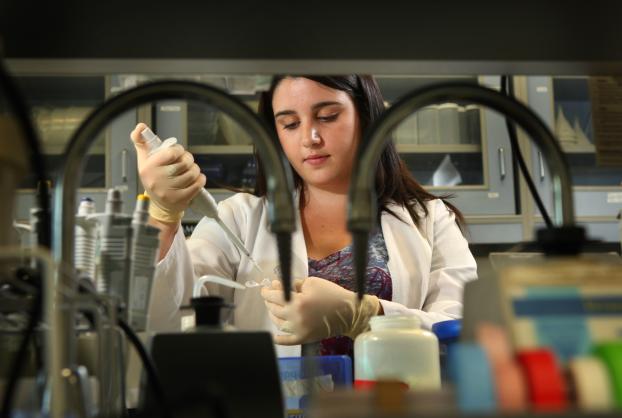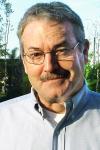 Caption: MARC scholar Macarena Aloi is researching ancient one-celled photosynthetic organisms. Photo by Karen Tapia
Caption: MARC scholar Macarena Aloi is researching ancient one-celled photosynthetic organisms. Photo by Karen Tapia
Hands-On Science
College of Natural Sciences and Mathematics Emphasizes Scientific Research Experience for Students
The College of Natural Sciences and Mathematics emphasized involving students with hands-on learning from the university’s inception more than 50 years ago. That notion was contrary to the general practice in which only graduate students did real research.
Those handful of early science and mathematics faculty believed having undergraduates apply what they had learned about science’s rigorous guidelines for collecting data then presenting results for all scientists to reconstruct and cross check, was the most effective and in-depth way to prepare them for careers in industry and research.
Since those early days, the college has expanded opportunities for its students by acquiring facilities in the desert, the coastal mountain ranges and on offshore islands, as well as maintaining field bases with universities in other states. In addition, faculty mentor students, working side-by-side with them in the laboratories and out in the field, and co-author peer-reviewed articles with them, a mark of their coming-of-age as scientists and mathematicians.
The college also administers seven programs designed to immerse students in rigorous research. They are mentored by, and work closely with, faculty members and officials from universities and government organizations internationally, with professional standards relentlessly applied so the students are ready for the professional world the day they graduate.
The programs target different student groups and various types of research done across the U.S. and in other countries. The website introduction to one of those programs — Southern California Ecosystems Research Program — is an example of how students are expected to ”do it all” without exceptions:
“If you like to work outdoors, enjoy working with animals or plants, getting your hands dirty, meeting new friends interested in ecology and environmental biology, networking with other students, getting to know faculty, and seeing new areas in Southern California, then SCERP could be for you!”
Andres Carillo (B.A. biological science ’07), now earning his master’s degree, applied to SCERP, seeing it as a way to pursue his passion, marine biology.
“I attended talks, networked with professors and discussed research with other students. I was submerged in the scientific community and for the first time I had my own research experiences and the knowledge that gave me the confidence to ask questions and contribute to discussions between professors and students. It was then that I identified myself as a scientist-in-training, but a scientist nonetheless.”
Dan Black (B.S. physics, ‘67), a multimillionaire entrepreneur who has given generously of his expertise, time and money for years, summed up his view of his education in 2007 when he was on campus to receive an honorary doctorate:
“Without my education at Cal State Fullerton, I probably would not have been able to achieve all that I have.”
October 27, 2010
 Alan Schafer, (B.A. biological science ’85), director of Science Funding at the Wellcome Trust, a nongovernmental source of funds in the United Kingdom and one of the world’s largest medical research charities based in London, is responsible for developing and overseeing its research grants.
Alan Schafer, (B.A. biological science ’85), director of Science Funding at the Wellcome Trust, a nongovernmental source of funds in the United Kingdom and one of the world’s largest medical research charities based in London, is responsible for developing and overseeing its research grants. Richard Shumway (B.A. biological science ’74), who just started at Irvine-based Allergan, a global research- and technology-driven health-care company, as vice president of quality assurance,
Richard Shumway (B.A. biological science ’74), who just started at Irvine-based Allergan, a global research- and technology-driven health-care company, as vice president of quality assurance, 